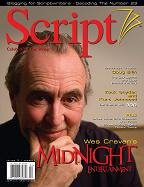Tuesday, January 09, 2007
Q&A with THE JEWELER'S WIFE screenwriter, David Shailer
In part two of my focus on the screenwriters behind my “Best of 2006,” I talked to David Shailer, author of the WWII drama THE JEWELER’S WIFE.
TUC: How did you come to write the script?
Shailer: I was watching a documentary called The Search for Nazi Diamonds which mentioned the 'Diamenten Juden' (Diamond Jews). They were spared deportation to the work/death camps by the Nazi High Command because they wanted the diamond business in Amsterdam to continue, from records of the Adolf Eichman trial. These Jews lived in a relatively low security environment probably still in their homes. But I thought a 'work camp' would give me a nice closed space -- and lower budget! I also knew that ordinary folk were unaware what was going on in the death camps until near the end of the war. As I continued watching, an idea popped into my head about a grumpy Jew who thinks he can get his wife back in return for work and the rest is history.
TUC: What's been happening with it?
Shailer: In actual fact, the version that you read is complete rewrite number four. In between major rewrites, I keep tinkering with it, improving little bits. Based on your comments, I now see another major rewrite coming on. I like that. I often write a piece and walk away for six months. I garner a few comments from here and there and come back to it for the inevitable rewrite. I figure I'll be rewriting it until it ends up on film. Earlier versions have received favorable comments on TriggerStreet, and one version became a quarter-finalist on American Zoetrope's 2006 Screenplay competition.
TUC: What research did you do for THE JEWELER'S WIFE, and how long did you spend on the script?
Shailer: Research and first draft took about three months. But in terms of research I already had a lot of material on WW2 -- a whole bookcase. I've also watched just about every documentary that's been shown on TV. I did do some internet research on the Dutch Jewish jewelers by reading the Adolf Eichman trial transcripts. I also looked at the Dutch resistance and got it clear in my head how the war progressed from a Dutch point of view. I like to get to the point in research/writing that I imagine I am actually there.
TUC: Are any of the character's based on real life?
Shailer: No, although I did have a pretty grumpy teacher once. As the Bible says, 'There's nothing new under the sun', so I guess the characters are based on a composite of people/characters from other situations etc. But there is no single historical figure other than Goering that I based the story on.
TUC: What other projects are you involved with?
Shailer: I have a woman-in-jeopardy thriller called VICTIM COMPLEX, optioned with Just Singer Entertainment. Also, I'm writing new material all the time as well as rewriting existing scripts. Currently, I have eleven other screenplays that I continue to improve/market. Most have been favorably commented on but 'not quite what we're looking for at the moment'. It seems people like my writing but have very specific projects in mind so it's a case of keep sending stuff out hoping to hit that "in the right place, at the right time, with the right quality" moment.
TUC: Do you write for a living?
Shailer: Yes and no. Yes, I write pretty much full-time at the moment. No, I don't make a living at it! Not yet anyways. So, I regularly fall back on my past occupation in I.T. to draw in some money. That and I have a very understanding wife who runs her own business. I call her the Sponsor of the Ass…oops, sorry, ARTS.
TUC: How long have you been writing?
Shailer: For as long as I could write. When I was younger I won awards for poetry. I've had comedy-sketch scripts published, performed at national arts festivals and on national radio. I also have a book on I.T. available at most leading online bookstores -- search on my name and you can't miss. As for screenplays, I've been writing them for about five years.
TUC: What are your hopes for the future?
Shailer: To sell a script and have it produced, of course. That's my main aim in writing -- to be a 'professional'.
TUC: Thanks so much for the chat, David. Good luck on your writing!
TUC: How did you come to write the script?
Shailer: I was watching a documentary called The Search for Nazi Diamonds which mentioned the 'Diamenten Juden' (Diamond Jews). They were spared deportation to the work/death camps by the Nazi High Command because they wanted the diamond business in Amsterdam to continue, from records of the Adolf Eichman trial. These Jews lived in a relatively low security environment probably still in their homes. But I thought a 'work camp' would give me a nice closed space -- and lower budget! I also knew that ordinary folk were unaware what was going on in the death camps until near the end of the war. As I continued watching, an idea popped into my head about a grumpy Jew who thinks he can get his wife back in return for work and the rest is history.
TUC: What's been happening with it?
Shailer: In actual fact, the version that you read is complete rewrite number four. In between major rewrites, I keep tinkering with it, improving little bits. Based on your comments, I now see another major rewrite coming on. I like that. I often write a piece and walk away for six months. I garner a few comments from here and there and come back to it for the inevitable rewrite. I figure I'll be rewriting it until it ends up on film. Earlier versions have received favorable comments on TriggerStreet, and one version became a quarter-finalist on American Zoetrope's 2006 Screenplay competition.
TUC: What research did you do for THE JEWELER'S WIFE, and how long did you spend on the script?
Shailer: Research and first draft took about three months. But in terms of research I already had a lot of material on WW2 -- a whole bookcase. I've also watched just about every documentary that's been shown on TV. I did do some internet research on the Dutch Jewish jewelers by reading the Adolf Eichman trial transcripts. I also looked at the Dutch resistance and got it clear in my head how the war progressed from a Dutch point of view. I like to get to the point in research/writing that I imagine I am actually there.
TUC: Are any of the character's based on real life?
Shailer: No, although I did have a pretty grumpy teacher once. As the Bible says, 'There's nothing new under the sun', so I guess the characters are based on a composite of people/characters from other situations etc. But there is no single historical figure other than Goering that I based the story on.
TUC: What other projects are you involved with?
Shailer: I have a woman-in-jeopardy thriller called VICTIM COMPLEX, optioned with Just Singer Entertainment. Also, I'm writing new material all the time as well as rewriting existing scripts. Currently, I have eleven other screenplays that I continue to improve/market. Most have been favorably commented on but 'not quite what we're looking for at the moment'. It seems people like my writing but have very specific projects in mind so it's a case of keep sending stuff out hoping to hit that "in the right place, at the right time, with the right quality" moment.
TUC: Do you write for a living?
Shailer: Yes and no. Yes, I write pretty much full-time at the moment. No, I don't make a living at it! Not yet anyways. So, I regularly fall back on my past occupation in I.T. to draw in some money. That and I have a very understanding wife who runs her own business. I call her the Sponsor of the Ass…oops, sorry, ARTS.
TUC: How long have you been writing?
Shailer: For as long as I could write. When I was younger I won awards for poetry. I've had comedy-sketch scripts published, performed at national arts festivals and on national radio. I also have a book on I.T. available at most leading online bookstores -- search on my name and you can't miss. As for screenplays, I've been writing them for about five years.
TUC: What are your hopes for the future?
Shailer: To sell a script and have it produced, of course. That's my main aim in writing -- to be a 'professional'.
TUC: Thanks so much for the chat, David. Good luck on your writing!
Subscribe to:
Post Comments (Atom)





1 comment:
Post a Comment